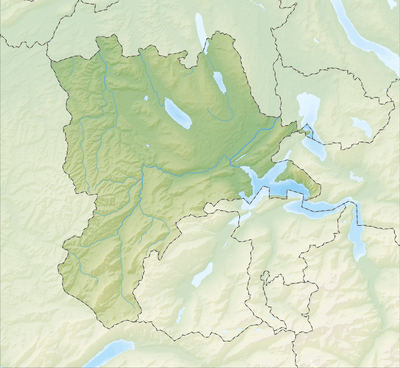Ebersecken
Ebersecken is a former municipality in the district of Willisau in the canton of Lucerne in Switzerland. On 1 January 2020 the former municipality of Ebersecken merged into Altishofen.
Ebersecken | |
|---|---|
 Coat of arms | |
Location of Ebersecken 
| |
 Ebersecken  Ebersecken | |
| Coordinates: 47°11′N 7°56′E | |
| Country | Switzerland |
| Canton | Lucerne |
| District | Willisau |
| Area | |
| • Total | 8.56 km2 (3.31 sq mi) |
| Elevation | 548 m (1,798 ft) |
| Population (2018-12-31)[2] | |
| • Total | 378 |
| • Density | 44/km2 (110/sq mi) |
| Postal code | 6245 |
| SFOS number | 1126 |
| Surrounded by | Altbüron, Altishofen, Fischbach, Grossdietwil, Nebikon, Ohmstal, Reiden, Schötz, Zell |
| Website | Profile (in German), SFSO statistics |
History
Ebersecken is first mentioned in 1274 as Eberseche. In 1275 it was mentioned as Ebersegge.[3]
Geography
Ebersecken has an area, as of 2006, of 8.6 km2 (3.3 sq mi). Of this area, 79% is used for agricultural purposes, while 17.2% is forested. Of the rest of the land, 3.7% is settled (buildings or roads) and the remainder (0.1%) is non-productive (rivers).[4] In the 1997 land survey, 17.39% of the total land area was forested. Of the agricultural land, 74.1% is used for farming or pastures, while 4.67% is used for orchards or vine crops. Of the settled areas, 2.33% is covered with buildings, 0.47% is classed as special developments, and 0.93% is transportation infrastructure.
The municipality is located in the Willisauer Bergland (Willisau highlands). It consists of the village of Ebersecken and several small hamlets.
Demographics
Ebersecken has a population (as of 31 December 2018) of 378.[5] As of 2007, 13 or about 3.1% are not Swiss citizens.[6] Over the last 10 years the population has grown at a rate of 0.5%. Most of the population (as of 2000) speaks German (98.0%), with Albanian being second most common ( 1.2%) and French being third ( 0.2%).
In the 2007 election the most popular party was the CVP which received 39.6% of the vote. The next three most popular parties were the FDP (28.6%), the SVP (28.4%) and the Green Party (1.9%).
The age distribution, as of 2008, in Ebersecken is; 133 people or 31.3% of the population is 0–19 years old. 108 people or 25.4% are 20–39 years old, and 132 people or 31.1% are 40–64 years old. The senior population distribution is 43 people or 10.1% are 65–79 years old, 7 or 1.6% are 80–89 years old and 2 people or 0.5% of the population are 90+ years old.[7]
The entire Swiss population is generally well educated. In Ebersecken about 54.7% of the population (between age 25-64) have completed either non-mandatory upper secondary education or additional higher education (either university or a Fachhochschule).
As of 2000 there are 122 households, of which 27 households (or about 22.1%) contain only a single individual. 35 or about 28.7% are large households, with at least five members.[7] As of 2000 there were 81 inhabited buildings in the municipality, of which 32 were built only as housing, and 49 were mixed use buildings. There were 18 single family homes, 9 double family homes, and 5 multi-family homes in the municipality. Most homes were either two (21) or three (8) story structures. There were only 1 single story buildings and 2 four or more story buildings.[7]
Ebersecken has an unemployment rate of 0.67%. As of 2005, there were 127 people employed in the primary economic sector and about 46 businesses involved in this sector. 6 people are employed in the secondary sector and there are 2 businesses in this sector. 45 people are employed in the tertiary sector, with 6 businesses in this sector.[4] As of 2000 52.2% of the population of the municipality were employed in some capacity. At the same time, females made up 36.5% of the workforce.
In the 2000 census the religious membership of Ebersecken was; 350 (86.6%) were Roman Catholic, and 23 (5.7%) were Protestant, with an additional 1 (0.25%) that were of some other Christian faith. There are 4 individuals (0.99% of the population) who are Muslim. Of the rest; there were 9 (2.23%) who do not belong to any organized religion, 17 (4.21%) who did not answer the question.[7]
The historical population is given in the following table:[3]
| year | population |
|---|---|
| about 1695 | ca. 150 |
| 1798 | 541 |
| 1850 | 583 |
| 1900 | 476 |
| 1950 | 552 |
| 1990 | 386 |
| 2000 | 404 |
References
- "Arealstatistik Standard - Gemeinden nach 4 Hauptbereichen". Federal Statistical Office. Retrieved 13 January 2019.
- "Ständige Wohnbevölkerung nach Staatsangehörigkeitskategorie Geschlecht und Gemeinde; Provisorische Jahresergebnisse; 2018". Federal Statistical Office. 9 April 2019. Retrieved 11 April 2019.
- Ebersecken in German, French and Italian in the online Historical Dictionary of Switzerland.
- Swiss Federal Statistical Office Archived January 5, 2016, at the Wayback Machine accessed 25-Aug-2009
- Swiss Federal Statistical Office - STAT-TAB, online database – Ständige und nichtständige Wohnbevölkerung nach institutionellen Gliederungen, Geburtsort und Staatsangehörigkeit (in German) accessed 23 September 2019
- LUSTAT-Canton Lucerne Statistical Office Archived February 29, 2012, at the Wayback Machine (in German) accessed 25 August 2009
- LUSTAT Lucerne Cantonal Statistics Archived November 27, 2011, at the Wayback Machine (in German) accessed 12 August 2009
External links
| Wikimedia Commons has media related to Ebersecken. |
- Ebersecken in German, French and Italian in the online Historical Dictionary of Switzerland.